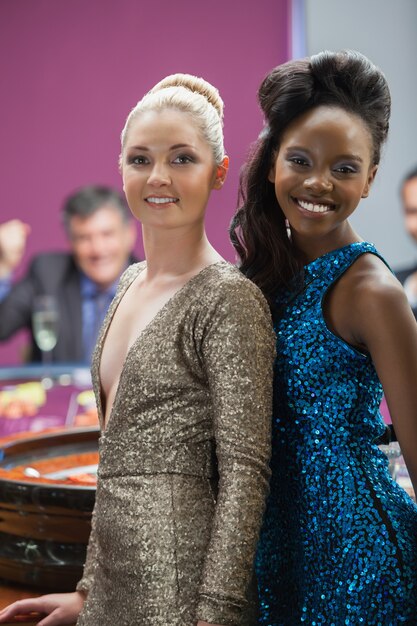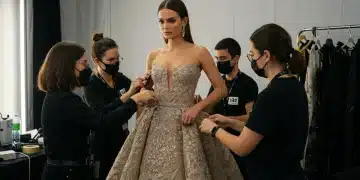Award Show Scandals: The Biggest Controversies of the Last 5 Years

Award show scandals have become increasingly prevalent, ranging from rigging accusations and diversity concerns to controversial acceptance speeches and wardrobe malfunctions, significantly impacting public perception and the credibility of these once-celebrated events.
Award shows, meant to celebrate the pinnacle of achievement in various fields, have increasingly become stages for controversy. In recent years, these events have been marred by scandals that have shaken public trust and sparked widespread debate. Let’s delve into the biggest award show scandals of the last five years.
Award Show Scandals: A Modern Phenomenon
The prevalence of scandals in award shows isn’t entirely new, but the intensity and scope have amplified in recent years, thanks to the rapid spread of information through social media and the increased scrutiny by a more socially conscious audience. These incidents often overshadow the achievements being celebrated.
The Impact of Social Media
Social media platforms have turned into echo chambers, amplifying both positive and negative reactions to events unfolding on stage. A single tweet or post can ignite a global conversation, impacting the reputations of individuals and the awards show itself.
Changing Public Expectations
Audiences today demand more from award shows than just entertainment. They expect inclusivity, fairness, and a level of social responsibility. When these expectations aren’t met, the backlash can be swift and severe.
In this section, we will discuss the modern phenomena of award show scandals.
- Increased Scrutiny: Every aspect of the show is heavily scrutinized, from the red carpet to the acceptance speeches.
- Viral Moments: A controversial moment can go viral in minutes, reaching a global audience.
- Demand for Accountability: Audiences expect awards shows to be held accountable for their actions and decisions.
- Shifting Cultural Landscape: As societal values evolve, so do the expectations for award shows.
In conclusion, the rise of award show scandals reflects broader societal shifts. The power of social media, combined with heightened public expectations, has created an environment where any misstep can lead to significant controversy. Awards shows must adapt to these changes or risk losing their relevance.

The 2022 Oscars Slap: A Moment That Rocked Hollywood
Perhaps one of the most shocking moments in recent award show history was the incident at the 2022 Oscars. The confrontation between Will Smith and Chris Rock reverberated far beyond the Dolby Theatre, triggering a fierce debate about humor, respect, and the boundaries of acceptable behavior.
The Incident
The controversy erupted when Chris Rock made a joke about Jada Pinkett Smith’s shaved head, a result of alopecia. Will Smith, initially laughing, appeared to take offense after seeing his wife’s reaction. He then walked onstage and slapped Rock across the face, returning to his seat and yelling profanities.
The Aftermath
The Academy faced immense pressure to respond decisively. Smith later apologized, but the Academy banned him from attending its events for ten years. The incident sparked conversations about the appropriateness of jokes at award shows and the limits of defending one’s family.
The Oscars slap sparked national, if not, international outcry due to the circumstances and participants of the controversy.
- Immediate Outrage: Social media exploded with opinions, ranging from condemnation of Smith’s violence to defense of his actions as protecting his wife.
- Academy’s Response: The Academy’s decision to ban Smith was met with mixed reactions, with some feeling it was too lenient and others too harsh.
- Re-evaluation of Humor: The incident forced a re-evaluation of the type of humor deemed acceptable at award shows, with many calling for more sensitivity.
To recap, the 2022 Oscars slap was a watershed moment that underscored the tensions simmering beneath the glitz of Hollywood. This scandal proved that award shows are not immune to real-world conflicts and that the actions of individuals on stage can have lasting repercussions.
#OscarsSoWhite: Diversity and Representation Debates
One of the most persistent and pervasive issues plaguing award shows is the lack of diversity. The #OscarsSoWhite movement, which gained traction in the mid-2010s, has continued to highlight the underrepresentation of people of color in nominations and wins.
The importance of diversity and representation is evident in today’s society; without it, award shows would not be successful.
The #OscarsSoWhite movement brought diversity to the forefront of Hollywood.
The Origins of #OscarsSoWhite
The hashtag was created in response to the all-white acting nominees at the 2015 and 2016 Academy Awards. It quickly became a rallying cry for greater inclusivity in the film industry.
Progress and Setbacks
While there have been some improvements in recent years, with more diverse nominees and winners, critics argue that the industry still has a long way to go. Token representation is not enough; systemic change is needed.
Diversity and inclusion are more than just buzzwords; they are integral to the future of award shows. A failure to reflect the diversity of the audience can lead to irrelevance and declining viewership.
- Calls for Systemic Change: Advocates are pushing for more diverse representation behind the camera, in executive positions, and within the voting bodies of award shows.
- Increased Awareness: The #OscarsSoWhite movement has raised awareness of the issue, forcing the industry to confront its biases.
- Tokenism vs. Genuine Inclusion: Critics argue that some efforts to improve diversity are merely performative, rather than addressing the root causes of underrepresentation.
Overall, the award show scandals surrounding diversity and representation underscore the need for sustained and meaningful change. The industry must move beyond superficial gestures and commit to creating a truly inclusive environment for all.

Controversial Acceptance Speeches: When Politics Take Center Stage
Award shows are not just about recognizing artistic achievement; they have also become platforms for political expression. While many welcome the use of these platforms to raise awareness about important issues, controversial acceptance speeches can sometimes overshadow the awards themselves.
The Power of the Platform
Acceptance speeches provide a unique opportunity for winners to speak directly to a global audience. Many use this platform to advocate for social justice, environmental protection, and other causes.
Backlash and Criticism
However, politically charged speeches can also provoke backlash, particularly if they are perceived as divisive or preachy. Some argue that award shows should focus solely on celebrating artistic merit, not political agendas.
Political acceptance speeches can both positively promote and negatively divide audiences.
- Balancing Act: Winners must navigate a difficult balance between expressing their views and alienating viewers.
- Authenticity vs. Opportunism: Some critics question whether political speeches are genuine expressions of belief or calculated attempts to gain publicity.
- The Risk of Alienation: Overly political speeches can turn off viewers who simply want to enjoy an evening of entertainment.
Essentially, controversial acceptance speeches highlight the complex relationship between art, politics, and celebrity. While these moments can be powerful and inspiring, they also carry the risk of alienating audiences and detracting from the achievements being celebrated.
Rigging Allegations: The Shadow of Doubt
Perhaps the most damaging type of scandal to plague award shows is the allegation of rigging. Accusations of unfair voting practices or behind-the-scenes manipulation can erode public trust and undermine the credibility of the entire event.
The Impact on Credibility
When viewers believe that awards are not being given out fairly, they are less likely to tune in. The perception of bias can taint the entire process, regardless of the actual integrity of the voting.
Examples of Allegations
There have been numerous instances of rigging allegations in recent years, ranging from claims of vote-buying to accusations of favoritism. These accusations often surface after surprise wins or perceived snubs.
Award shows are known for their prestige and influence, and such rigging allegations could be detrimental.
- Vote-Buying: Claims that individuals or organizations have attempted to influence the voting process through financial incentives.
- Favoritism: Accusations that certain nominees are unfairly favored due to personal connections or political considerations.
- Lack of Transparency: Criticisms of the voting process, which is often shrouded in secrecy.
To conclude, rigging allegations pose a significant threat to the legitimacy of award shows. Transparency and fairness are essential to maintaining public trust and ensuring that the awards are seen as a true reflection of artistic merit.
Wardrobe Malfunctions and Cultural Appropriation: Fashion Faux Pas
The red carpet is often as eagerly anticipated as the award show itself, but it can also be a minefield of potential controversy. Wardrobe malfunctions and accusations of cultural appropriation can quickly turn a fashion statement into a public relations disaster.
Award shows require the proper attire for all participants that is respectful to the art.
The Perils of the Red Carpet
Celebrities are under immense pressure to make a statement with their fashion choices, but sometimes these choices can backfire. Wardrobe malfunctions can be embarrassing, while cultural appropriation can be deeply offensive.
Defining Cultural Appropriation
Cultural appropriation occurs when someone adopts elements of a culture that is not their own, often without understanding or respecting its original context. This can include clothing, hairstyles, and other forms of expression.
Wardrobe malfunctions and cultural appropriation have caused controversies within the award show community that requires more attention.
- Context Matters: What might be seen as a harmless fashion choice can be deeply offensive if it appropriates cultural symbols without understanding their significance.
- Sensitivity and Respect: Celebrities are increasingly expected to be aware of the potential impact of their fashion choices and to show respect for other cultures.
- The Role of Social Media: Social media plays a key role in calling out instances of cultural appropriation and holding celebrities accountable for their actions.
In short, wardrobe malfunctions and accusations of cultural appropriation highlight the need for greater sensitivity and awareness on the red carpet. Celebrities must understand the implications of their fashion choices and avoid perpetuating harmful stereotypes.
| Key Point | Brief Description |
|---|---|
| 🔥 Oscars Slap | Will Smith’s on-stage altercation sparked global debate. |
| ✊ #OscarsSoWhite | Lack of diversity in nominations triggered social movement. |
| 🗣️ Political Speeches | Controversial speeches divide audiences and overshadow awards. |
| 🤔 Rigging Claims | Accusations of unfair practices erode public trust. |
FAQ
▼
The #OscarsSoWhite movement highlighted the lack of diversity in the Academy Awards nominations, particularly the absence of people of color in the acting categories, sparking a broader conversation about inclusivity in Hollywood.
▼
At the 2022 Oscars, Will Smith slapped Chris Rock on stage after Rock made a joke about Jada Pinkett Smith’s shaved head, resulting in widespread criticism and disciplinary action by the Academy.
▼
Acceptance speeches can become controversial when winners use their platform to express political views or make statements that some audience members find offensive, divisive, or inappropriate for the occasion.
▼
Cultural appropriation in fashion refers to the adoption of elements from a culture that is not one’s own, often without understanding or respecting its original context, which can be offensive and disrespectful.
▼
Rigging allegations damage the credibility of award shows by creating a perception of unfairness and bias, undermining public trust and potentially leading to a decline in viewership and industry support.
Conclusion
In conclusion, the award show scandals of the last five years have highlighted the complex challenges facing these institutions. As they navigate issues of diversity, political expression, and integrity, award shows must adapt to changing societal expectations in order to remain relevant and respected.





